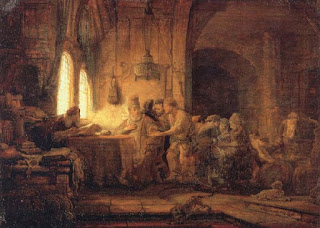 |
| Rembrandt's "Parable of the Landowner." |
“Is your eye envious because I am generous?” The landowner says to a complaining worker in Matthew 20:15
“I'm not all that much of a praying person, and I'm definitely not a religious person, but I do consider myself a Christian. I guess I might be a C-minus Christian, but I am one." (Johnny Cash, from liner notes of Cash Unearthed)
“The work of Jesus brings about many reversals and the Day of Judgment will be full of surprises.” (F.F. Bruce, Hard Sayings of Jesus, p.201)
In this passage Jesus is answering a question from Peter about His dialogue with the rich young ruler (Matthew 19:16-22). Peter asked, “We have left everything and have followed You; what then will there be for us?” (Matthew 19:27). Jesus answers Peter in two parts, the first part ends with, “many who are first will be last; and the last, first” (Matthew 19:30). In His second part (explored here; the parable of the landowner), Jesus flips the metaphorical coin over. He swaps the order of the wording but still using the same phrase: “the last shall be first, and the first, last” (v. 16).
Matthew, Mark and Luke all write about Jesus’ first answer to Peter regarding rewards (Mark 10:28-31; Luke 18:28-30). But Matthew is the only one to include Jesus’ second part, the parable given in 20:1-16. Matthew was a tax collector. He was familiar with financial matters, record keeping and the tenuous relationship between boss and wage earner, tax enforcer and tax payer. It is no wonder that the Holy Spirit calls on Matthew to include this parable in his gospel.
A few verses earlier Jesus put the wealthy on notice by saying, “it is easier for a camel to go through the eye of the needle than for a rich man to enter the kingdom of God” (Matthew 19:24). But Jesus is an equal opportunity offender. Now He turns the tables and challenges the claims that maybe today’s union worker has on the kingdom of God. Using a story about a landowner and laborers, Jesus continues to confront our assumptions and shift our paradigms.
The landowner early in the morning hires a group of workers at a set wage and sends them off to work his vineyard (vv. 1-2). At intervals throughout the day the landowner hires more (vv. 3-7). When the landowner pays up, he pays first those hired last, those who worked the shortest (v.8). And he pays them the same wage he promised those who worked all day. When he pays those he hired first, they thought they would receive more (v.10), yet the landowner pays them the same earlier agreed upon amount. Then the workers grumbled at the landowner (v. 11). “Hey! That’s not fair! We worked all day” the laborers seem to say, “these jokers just got here. We’ve been working in the hot sun all day!” (v.12)
I understand this grumbling. I admit a surge of pride when I read the previous verses (Matthew 19:29) and began to think about my “reward.” In my pride I reason, “Why should those that have death bed conversions or who fail to sacrifice as much as *I have* experience the same salvation I will?” In one way I’m right. It’s not fair. But the twist is that it’s not fair ANYONE receives salvation. It’s not fair ANY sinful human experiences the glory of His holy heaven.
NO ONE deserves salvation; there is none righteous, not one, (Psalm 14:3). Because all of us have sinned against infinitely holy Almighty God, our deserved wage is death. But this same infinitely holy God is also infinitely loving. He freely offers eternal life through Jesus Christ (Romans 6:23). Anyone who receives salvation receives it by faith through grace, not as a reward of human effort. Yes, we serve Him. And we serve Him with great joy. But we dare not make God our debtor and say, “He owes me salvation.” His love is the reason for our labor, never the result of our labor.
We are all equal before the cross. All who call upon the Lord will be saved (Romans 10:13), whether it is the young child who walks with the Lord for generations, or whether it is the murderer who calls upon the Lord in his final hour. The Lord can say, “I am doing you no wrong” (v.13) when He equally saves, whether it is those who serve Him faithfully and passionately or those whose walk with Him is a constant struggle and battle.
Our Master is wonderfully, beautifully and eternally generous. From a human perspective, that generosity is not fair. And undeserving! Scripture says this: the least deserving will be fully paid; the last will be first and the first last (v.16). Instead of begrudging His generosity, may we rejoice and prepare for an eternity of fellowship with and worship of the great generous God of the universe!
